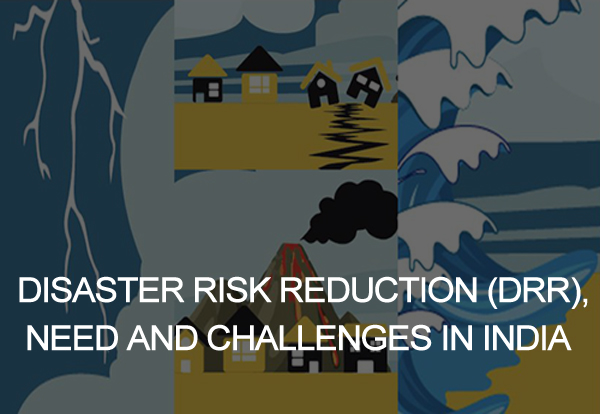Disaster Risk Redution Need and Challenges In India

As we are aware, among the South Asian countries, India is the most vulnerable country to disasters due to its diverse and vulnerable geo-climatic physicality. Further, dependency of the local community and the economy on agro based activities, monsoon and due to some other factors like lack of awareness, illiteracy, poverty prevalent in our society, it is all the more necessary that we learn lessons from past impacts of disasters and prepare ourselves for a better livable tomorrow.
Disaster Risk Reduction (DRR) is a tool in our hands which includes all the phases of pre-disaster i.e. prevention, mitigation and preparedness and thereby enhances the possibility of less impact, less losses and better chances of building back better the damaged systems. It is also a clear mandate of the Sendai Framework of Actions (2015-2030) for the whole world.
Need:-
There is a sheer need to first understand the existing or impending disaster risks and then strengthen our disaster risk governance mechanisms so that we are prepared and not caught on the wrong foot when disasters do strike. Further, we need to change our outlook towards spending money in DRR measures especially the mitigation part so that whatever impacts a disaster might cause to our system, we can withstand it amicably. Last but not the least, during recovery, reconstruction and rehabilitation phase, we need to enhance our capabilities in such a fashion that we build back better the existing system/infrastructure/capacity.

Further, we are a developing nation. We have to utilize our scarce resources in developmental activities in such a way that they are sustainable for a substantial long period of time, so that the resources can then be diverted to other developmental projects. Whatever we build, should withstand the challenges of extreme weather conditions, fragile geographical state and the socio-economic vulnerabilities of our nation. Every single penny is hard earned here and should be accounted for. This can be done by realizing the best possible outcome of it.
Challenges in India:-
Nothing will come easy on a platter in our country. We need to resolve ourselves with sheer commitment, vigor and zeal to find pathways for a better tomorrow through few highlighted challenges as listed below:-
Unsafe Building practices and non-implementation of existing building codes;
Lack of awareness as well as unwillingness to finance necessary mitigation measures by the community;
Mainstreaming into developmental activities often gets blocked due to lack of political will, delay in getting administrative and financial sanctions etc.
Corruption at various levels can be a major catalyst and hindrance in funds not reaching where it should reach;
Unpredictable climate change and increase in extreme event occurrence;
Most valuable/vulnerable segment – poor, marginalized, women, children, elderly, differently challenged people, not finding their due place in the policy documents for DRR;
Transfer of lessons learnt from pre and post disaster management segment to the local community not being done;
Cross boundary issues between States in India as well as between our neighboring countries, may pose detrimental to any DRR effort on the long run;
Capacity Building – a fool-proof system, proper coordination and regularity are missing links. Regional Response Network by pooling local capacities needs to be developed;
Extremism, Naxalism, Social unrest (caste or religion based fights), terrorism based endangered socio-economic stability also hinder a dedicated DRR process;
As we say ourselves, where there is a will there is a way. We, as a Common but resolved citizen of India can start by contributing whatever little we can, from whatever position we are in and through whatever means/tools we get hold of. Rebuilding a resilient nation/society can never be a task of a single entity. It is a wholesome task and responsibility of all the stakeholders in this country, who believe in Nationhood and Mother India.

